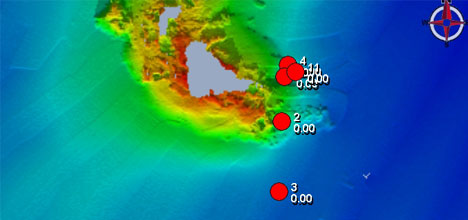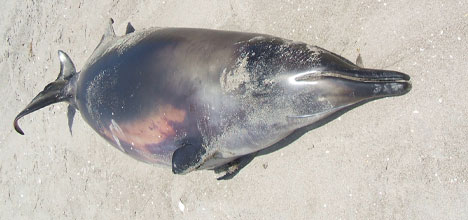The company contracted to undertake sonar searches for sunken Rena containers in the area is adamant the equipment being used is not interfering with marine life.
Four Gray's Beaked whales stranded and died on Papamoa Beach on Saturday inciting fears that the use of sonar equipment was interfering with the whales' habitat.
A dead Gray's Beaked whale at Papamoa Beach last Saturday. Photo: Chris Clark.
Tauranga based Discovery Marine Limited is the contracted sonar operator and its managing director, Greg Cox, says their equipment is of a similar frequency to those used by recreational fishermen.
'All of the systems are low power and operate on a similar frequency to most recreational fish finders, common on almost every boat on the water.
'In fact, some deep water recreational fish finders operate on more powerful low frequency systems and are more likely to cause harm.”
The company is using three sonar systems to search for containers; a side scan sonar using a 325khz frequency with an approximate 5W power output two, a single beam echo sounder using a 200kHz frequency and a 2-5W power output three, and a multi-beam echo sounder with 160kHz frequency and power output of less than 5W.
Greg says the multi-beam echo sounder is a very wide beam sounder that covers three and a half times the width of water.
'It gives us quick coverage of the water, as opposed to a conventional echo-sounder.”
The side-scan sonar is a towed device that looks out across the seabed and provides an image of the ocean to locate any objects that may be on the seabed.

Sonar has revealed the position of these five containers near the Astrolabe Reef.
Greg says they are using a magnetometer, an instrument used to measure the strength or direction of a magnetic field, which gives a signal when it detects metal in a container.
He says all of these are high frequency and low power, and evidence shows most damage to wildlife is caused by low frequency, high power sources.
'Research indicates that some damage to marine mammals may be caused by very low frequency, high power sonar sources – that is not the gear we are using.
'Things like sonars used in submarines and seismic work – that is the gear that puts a lot of power into the water column.
'We are using lightweight sonar – the sound pulse dissipates fairly quickly.”
Chris Clark from the Department of Conservation says at this stage there is no evidence to suggest any cause for concern for whale populations in the wider Bay of Plenty.
'I understand the equipment that is currently being used is no different than what is found on a fishing boat.
'I haven't found any evidence to suggest that what they have been doing out there is likely to cause or have any adverse effect on the marine animals.
'We will continue to monitor this though.”
Chris says whales frequently strand in the Bay of Plenty and there are a number of reasons for this.
'Sometimes whales strand when there is one sick whale, there is also an instinct to return to land – when they are sick they have a tendency to come in.
'Sometimes when one comes in it draws the other healthy whales in, which I think was the case last weekend.”
Chris attended the whale stranding of two adult females and two calves at Papamoa Beach last weekend.
'The juveniles came in with their mothers and tragically died the two babies died with their mothers.
'Something that was quite negative turned into a positive experience, with the people who reported it and iwi representatives who helped us with the stranding.
'What we did was all we could do for them and it was done properly.”
In October 2011, another group of three Gray's Beaked whales stranded on Papamoa Beach. One of the whales, a juvenile, died while the other two were refloated.
At the time a full necropsy and CT scan was undertaken of the whale and DOC reports no evidence showed the sonar was related to the death or stranding of the whales.
'One of the previous whales was sent away for tests and I understand there was no evidence to show anything adverse.”
Samples from the dead whales on Papamoa Beach last weekend have been sent to Massey University for analysis and DOC is waiting for a report.



0 comments
Leave a Comment
You must be logged in to make a comment.